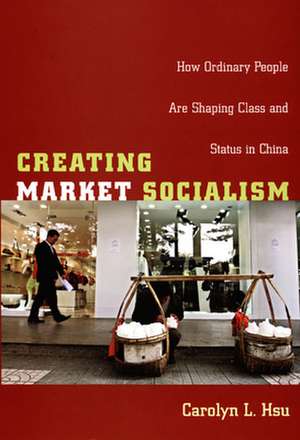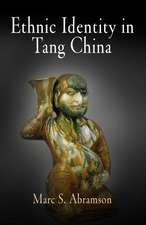Creating Market Socialism – How Ordinary People Are Shaping Class and Status in China: Politics, History, and Culture
Autor Carolyn L. Hsuen Limba Engleză Paperback – 2 sep 2007
Din seria Politics, History, and Culture
-
 Preț: 240.73 lei
Preț: 240.73 lei -
 Preț: 210.26 lei
Preț: 210.26 lei -
 Preț: 247.63 lei
Preț: 247.63 lei -
 Preț: 265.79 lei
Preț: 265.79 lei -
 Preț: 238.39 lei
Preț: 238.39 lei -
 Preț: 261.56 lei
Preț: 261.56 lei -
 Preț: 263.47 lei
Preț: 263.47 lei -
 Preț: 306.60 lei
Preț: 306.60 lei -
 Preț: 264.26 lei
Preț: 264.26 lei -
 Preț: 305.61 lei
Preț: 305.61 lei -
 Preț: 262.70 lei
Preț: 262.70 lei -
 Preț: 303.33 lei
Preț: 303.33 lei -
 Preț: 262.52 lei
Preț: 262.52 lei -
 Preț: 212.48 lei
Preț: 212.48 lei -
 Preț: 261.56 lei
Preț: 261.56 lei -
 Preț: 262.32 lei
Preț: 262.32 lei -
 Preț: 230.02 lei
Preț: 230.02 lei -
 Preț: 237.47 lei
Preț: 237.47 lei -
 Preț: 335.88 lei
Preț: 335.88 lei -
 Preț: 300.83 lei
Preț: 300.83 lei -
 Preț: 261.56 lei
Preț: 261.56 lei -
 Preț: 238.39 lei
Preț: 238.39 lei -
 Preț: 262.14 lei
Preț: 262.14 lei -
 Preț: 312.74 lei
Preț: 312.74 lei -
 Preț: 260.41 lei
Preț: 260.41 lei -
 Preț: 310.83 lei
Preț: 310.83 lei -
 Preț: 300.24 lei
Preț: 300.24 lei -
 Preț: 335.12 lei
Preț: 335.12 lei -
 Preț: 234.61 lei
Preț: 234.61 lei -
 Preț: 223.65 lei
Preț: 223.65 lei -
 Preț: 256.06 lei
Preț: 256.06 lei
Preț: 238.01 lei
Nou
Puncte Express: 357
Preț estimativ în valută:
45.55€ • 47.38$ • 37.60£
45.55€ • 47.38$ • 37.60£
Carte tipărită la comandă
Livrare economică 14-28 aprilie
Preluare comenzi: 021 569.72.76
Specificații
ISBN-13: 9780822340362
ISBN-10: 0822340364
Pagini: 240
Ilustrații: 4 illustrations
Dimensiuni: 155 x 232 x 21 mm
Greutate: 0.33 kg
Editura: MD – Duke University Press
Seria Politics, History, and Culture
Locul publicării:United States
ISBN-10: 0822340364
Pagini: 240
Ilustrații: 4 illustrations
Dimensiuni: 155 x 232 x 21 mm
Greutate: 0.33 kg
Editura: MD – Duke University Press
Seria Politics, History, and Culture
Locul publicării:United States
Notă biografică
Carolyn L. Hsu
Recenzii
"Carolyn L. Hsu examines the narrative construction of systems of value and stratification in the transition away from socialist economic structures. This emphasis allows her to move beyond studies of stratification that are overly focused on state institutions. She demonstrates how people from all walks of life reinterpret the narratives issued from various organs of the Chinese state and how these reinterpretations affect the job choices and life strategies of individuals as well as the corporate and collective strategies of the institutions for which they work. In so doing, she makes an important contribution not only to the study of post-Mao China but also to the sociology of post-socialist societies more generally."--Andrew Kipnis, author of China and Postsocialist Anthropology: Theorizing Power and Society after Communism Shortlisted for ICAS Book Prize 2009 in Social Sciences
Textul de pe ultima copertă
"Carolyn L. Hsu examines the narrative construction of systems of value and stratification in the transition away from socialist economic structures. This emphasis allows her to move beyond studies of stratification that are overly focused on state institutions. She demonstrates how people from all walks of life reinterpret the narratives issued from various organs of the Chinese state and how these reinterpretations affect the job choices and life strategies of individuals as well as the corporate and collective strategies of the institutions for which they work. In so doing, she makes an important contribution not only to the study of post-Mao China but also to the sociology of post-socialist societies more generally."--Andrew Kipnis, author of "China and Postsocialist Anthropology: Theorizing Power and Society after Communism"
Cuprins
Acknowlegments ix
1. How Narratives Shape Institutional Change 1
2. Narratives and the Socialist Stratification System 31
3. Harbin: From Paris of the East to the Rust Belt 54
4. The Path of Power: Revising the Meaning of Political Capital 81
5. Constructing Entrepreneurship: The Moral Meaning of Money 122
6. Trust in Knowledge: Human Capital and the Emerging Suzhi Hierarchy 157
7. The Narrative Construction of Class and Status under Market Socialism: The Emerging Suzhi Hierarchy 181
Appendix 1. Fieldwork Sites and Interview Sample and Questions 191
Appendix 2. Glossary of Chinese Terms 197
Notes 201
Bibliography 205
Index 217
1. How Narratives Shape Institutional Change 1
2. Narratives and the Socialist Stratification System 31
3. Harbin: From Paris of the East to the Rust Belt 54
4. The Path of Power: Revising the Meaning of Political Capital 81
5. Constructing Entrepreneurship: The Moral Meaning of Money 122
6. Trust in Knowledge: Human Capital and the Emerging Suzhi Hierarchy 157
7. The Narrative Construction of Class and Status under Market Socialism: The Emerging Suzhi Hierarchy 181
Appendix 1. Fieldwork Sites and Interview Sample and Questions 191
Appendix 2. Glossary of Chinese Terms 197
Notes 201
Bibliography 205
Index 217














